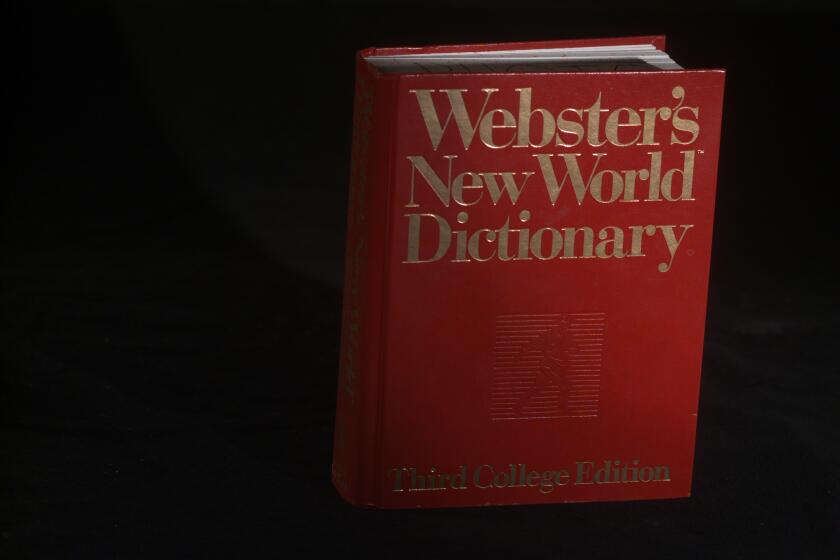A Word, Please: Seven words whose common use would have made past grammar experts livid

These days, we’re all experts in the perils of time travel. Through extensive research in front of our TVs, we know that if we go back in time we should never step on a bug, never try to talk sense into Yoko, and, most crucial, never, ever get romantic with an enchanting stranger who “reminds us” of our grandmother or grandfather.
But there’s one peril we’re completely unprepared for: old-timey grammar snobs. Turns out, Marty McFly and Stewie Griffin have been utterly negligent in preparing us for what would happen should we go back, say, 60 or 70 years and use a word like “deplore,” “essential,” “gorgeous” or “livid.” Spoiler alert: We would be wrong, wrong, wrong — at least according to some influential language experts at the time. Here’s a list of seven dangerous words to put on a Post-it note in your time machine.
Absolutely. Thinking about time traveling back to the Roaring ’20s? If your answer is “absolutely!” you’re in trouble. Word cops of the day, notably the author F.K. Ball, had a bone to pick with “absolutely”: “It is much used, but seldom needed,” he wrote. Decades later, Ball’s peeve was still going strong, with language commentators saying it’s bad to use “absolutely” to mean “yes.”
Concept. Do you find time travel to be a fascinating concept? Well, if you go back to 1965, keep it to yourself. “The tendency among some groups, particularly social workers, teachers, and advertising writers, to make the lesser seem the greater and to enfold the commonplace in the mantle of science or philosophy has had a debasing effect on the word ‘concept,’” wrote Theodore M. Bernstein in the righteous burn on social workers we never knew we needed till he laid it down. A concept, Bernstein insists in “The Careful Writer,” isn’t an idea. It’s “an idea that results from drawing a generalization from particulars.” You’ve been warned.
Deplore. If you think “deplorable” is a loaded word today, take a little trip back to 1942 when one Eric Partridge couldn’t think of a single thing more deplorable than the way we modern folks use the word “deplore.” As he wrote in “Usage and Abusage,” you can’t deplore a human being (did I mention it was 1942?). “‘Deplore’ governs a thing or quality, not a person.”
With the word “back,” “hearken,” “harken” and “hark” take on a different meaning than their original definition, “listen.”
Essential. For me, the best reason to travel back to 1961 would be to lure author Thomas Elliott Berry onto my time machine for a return trip to 2024. I’d take him to a cosmetics counter and show him all the products made with essential oils. Then I’d take him to a bookstore and turn to the entry for “essential” in every dictionary on the shelf. Then I’d sit back and watch his head explode. As Berry wrote in “The Most Common Mistakes in English Usage,” the word “essential” means only “necessary for the existence of. … It should not be used synonymously with ‘important.’”
Gender. Returning now to the Department of Don’t Go There, the word “gender” doesn’t mean what you think it means. At least it didn’t used to, according to Bernstein. People and animals don’t have genders, he said. Only words do. “‘Gender’ is a grammatical term, denoting (in English) whether words pertaining to a noun or pronoun are classed as masculine, feminine, or neuter,” he insists in “The Careful Writer.” “It is not a substitute for ‘sex’ (but, then, what is?).”
Gorgeous. There’s more than one reason you should avoid calling someone “gorgeous” if you go back to 1965. For the most important of them, I refer you back to the grandmother/grandfather warning above. But almost as perilous: Anyone who read Bernstein’s book will sneer at your vocabulary. “‘Gorgeous’ applies not to a person but to the adornment of a person,” he wrote. “As a synonym for ‘beautiful’ or ‘splendid,’ the word is slang.”
Livid. Have you heard that someone was so angry they were “livid”? Or perhaps you heard someone use “livid,” as Truman Capote did, to mean a shade of red? Back in the day, that would have made Berry downright … well, livid. Per his 1961 rant, “livid” means only a bluish color, the color of lead or the color of bruised flesh.
June Casagrande is the author of “The Joy of Syntax: A Simple Guide to All the Grammar You Know You Should Know.” She can be reached at [email protected].
All the latest on Orange County from Orange County.
Get our free TimesOC newsletter.
You may occasionally receive promotional content from the Daily Pilot.




